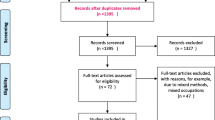Abstract
Early childhood educators worldwide all strive to improve the quality of care and education for young children through sustainable pathways. One such pathway is professional development (PD). In the United States, ongoing PD has been recognized as critical to enhancing practitioners’ professional competence. Situated within the broader context of early childhood professional development systems, this study examined the New Jersey Infant/Toddler Credential (NJITC) as a case of PD. Specifically, we evaluated the effectiveness of the NJITC as PD by investigating its process as well as impact on the participating practitioners’ professional growth and practice from multiple perspectives: written reflections from a course instructor and a childcare center director; survey reflective responses from 12 practitioners; and informal conversations with childcare center directors, course instructors, field supervisors, and practitioners. The findings revealed that having the NJITC coursework offered through an onsite PD model and supported by a state-based scholarship program provided much needed incentives to encourage participation. It also resulted in improved professional growth and practice among the participating practitioners. However, it is only to the extent that the infant/toddler practitioners continue to engage in continuous PD beyond the ITC coursework will they be able to keep themselves abreast of the state of knowledge and best practices from which to further enhance their professional competence. In light of the process and impact of the NJITC on practitioners’ acquisition of specialized knowledge, skills, and dispositions to effectively work with infants and toddlers, implications and recommendations for policy are discussed.
Similar content being viewed by others
Notes
The courses may be named differently across high education institutions and early childhood PDS, but their ungirding concept and associated content and training are similar.
References
Advocates for Children of New Jersey. (2015). Starting off strong: Making infants and toddlers a priority in New Jersey. NJ: Newark.
Cain, D. W., Rudd, L. C., & Saxon, T. F. (2007). Effects of professional development training on joint attention engagement in low-quality childcare centers. Early Child Development and Care, 177(20), 159–185.
Center on the Developing Child at Harvard University. (2007). Summary of findings: A science- based framework for early childhood policy: Using evidence to improve outcomes in learning, behavior and health for vulnerable children. Cambridge, MA: Author.
Coalition of Infant/Toddler Educators. (2009). Technical assistance manual for the New Jersey Infant/Toddler Credential. New Jersey: Professional Impact NJ and New Jersey First Steps.
Copple, C., & Bredekamp, S. (Eds.). (2009). Developmentally appropriate practice in early childhood programs serving children from birth through age 8 (3rd ed.). Washington, DC: National Association for the Education of Young Children.
Early, M. D., & Winton, P. J. (2001). Preparing the workforce: Early childhood teacher preparation at 2- and 4-year institutions of higher education. Early Childhood Research Quarterly, 16(3), 285–306.
Gebhard, B., Ochshorn, S., & Jones, L. (2012). Toward a bright future for our youngest children: Building a strong infant toddler workforce. Washington, DC: Zero to Three Policy Center.
Herzenberg, S., Price, M., & Bradley, D. (2005). Losing ground in early childhood education: Declining workforce qualifications in an expanding industry, 1979–2004. Washington, DC: Economic Policy Institute.
Kreader, J. L., Ferguson, D., & Lawrence, S. (2005). Infant and toddler child care quality. Retrieved from the National Center for Children in Poverty at http://www.nccp.org/publications/pub_626.html.
LoCasale-Crouch, J., Konold, T., Pianta, R., Howes, C., Burchinal, M., Bryant, D., et al. (2007). Observed classroom quality profiles in state-funded pre- kindergarten programs and associations with teacher, program, and classroom characteristics. Early Childhood Research Quarterly, 22(1), 3–17.
Mamedova, S., & Redford, J. (2015). Early Childhood Program Participation, From the National Household Education Surveys Program of 2012 (NCES 2013-029.REV). National Center for Education Statistics, Institute of Education Sciences, U.S. Department of Education. Washington, DC. Retrieved from http://nces.ed.gov/pubs2013/2013029rev.pdf.
Morgan, G. G., & Fraser, J. (2007). Professional development and higher education systems to develop qualified early childhood educators. In C. J. Groark, K. E. Mehaffie, R. B. McCall, M. T. Greenberg, C. J. Groark, K. E. Mehaffie, et al. (Eds.), Evidence-based practices and programs for early childhood care and education (pp. 159–180). Thousand Oaks, CA: Corwin Press.
National Infant & Toddler Child Care Initiative (NITCCI). (2010). Infant/toddler credential factsheet. Retrieved from https://childcareta.acf.hhs.gov/sites/default/files/public/infant-toddler_credential_factsheet_0.pdf.
National Infant & Toddler Child Care Initiative and Zero to Three (NITCCI and ZERO TO THREE). (2007). Credentials for the infant/toddler child care workforce: A technical assistance tool for child care and development fund administrators. Washington, DC: U.S. Department of Health & Human Services, Administration for Children and Families Office of Family Assistance Child Care Bureau. Retrieved from http://main.zerotothree.org/site/DocServer/ITC_TA_Tool.pdf?docID=4245.
National Institute of Child Health and Human Development (NICHD) Early Child Care Research Network. (2002). Early child care and children’s development prior to school entry: Results from the NICHD study of early child care. American Educational Research Journal, 39(1), 133–164.
National Institute of Child Health and Human Development (NICHD). (2006). The NICHD study of early child care and youth development: Findings for children up to age 4½ years (NIH Publication No. 05-4318). Washington, DC: U.S. Department of Health and Human Services.
Pianta, R. C., Howes, C., Burchinal, M., Bryant, D., Clifford, R., Early, D., et al. (2005). Features of pre-kindergarten programs, classrooms, and teachers: Do they predict observed classroom quality and child-teacher interactions? Applied Developmental Science, 9(3), 144–159.
Ridley, S. M., McWilliam, R. A., & Oates, C. S. (2000). Observed engagement as an indicator of child care program quality. Early Education & Development, 11(2), 133–146.
Schon, D. (1983). The reflective practitioner: How professionals thinking action (p. 1983). New York: Basic Books.
Sheridan, S., Edwards, C., Marvin, C. A., & Knoche, L. L. (2009). Professional development in early childhood programs: Process issues and research needs. Early Education and Development, 20(3), 377–401.
Shonkoff, J., & Phillips, D. (Eds.). (2000). From neurons to neighborhoods: The science of early childhood development. Washington, DC: National Academy Press.
Shore, R. (1997). Rethinking the brain: New insights into early development. New York: Families and Work Institute.
Zaslow, M., & Martinez-Beck, I. (Eds.). (2006). Critical issues in early childhood professional development. Baltimore, MD: Paul H. Brookes Publishing.
Zaslow, M., Tout, K., Halle, T., & Starr, R. (2010). Professional development for early educators: Reviewing and revising conceptualizations. In S. Neuman & D. Dickinson (Eds.), Handbook of early literacy research (Vol. 3, pp. 425–434). New York: Guilford Publications.
Author information
Authors and Affiliations
Corresponding author
Rights and permissions
About this article
Cite this article
Chen, J.J., Martin, A. & Erdosi-Mehaffey, V. The Process and Impact of the Infant/Toddler Credential as Professional Development: Reflections from Multiple Perspectives and Recommendations for Policy. Early Childhood Educ J 45, 359–368 (2017). https://doi.org/10.1007/s10643-015-0767-5
Published:
Issue Date:
DOI: https://doi.org/10.1007/s10643-015-0767-5




